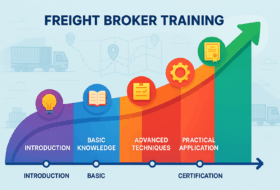How Freight Brokers Save Businesses Time and Money: 5 Key Benefits
In the fast-paced world of logistics, businesses face the constant challenge of moving goods efficiently while keeping costs low. Freight brokers have emerged as essential partners, bridging the gap between shippers and carriers to streamline operations and drive savings. By leveraging their expertise, networks, and technology, freight brokers help businesses save both time and money. Here are five key ways they make a difference.
The Role of Freight Brokers in Logistics
Freight brokers act as intermediaries, connecting businesses needing to ship goods with carriers who have the capacity to transport them. They handle the complexities of logistics, from negotiating rates to ensuring timely deliveries, allowing businesses to focus on their core operations. With the freight industry generating over $1.3 trillion in revenue annually, brokers play a pivotal role in keeping goods moving across the U.S., where trucks handle 70% of freight transport.
Here’s how freight brokers deliver time and cost savings:
1. Access to a Vast Carrier Network
Freight brokers maintain extensive networks of vetted carriers, giving businesses access to thousands of trucks without the need to build relationships themselves. This eliminates the time-consuming process of sourcing reliable carriers. Brokers also negotiate competitive rates, often securing volume discounts that smaller businesses wouldn’t access on their own, reducing shipping costs by up to 15-20% in some cases.
2. Expertise in Negotiating Rates
Negotiating freight rates requires market knowledge and strong relationships with carriers. Freight brokers, handling hundreds of shipments weekly, are skilled at securing cost-effective rates. They analyze market trends, fuel costs, and demand to ensure businesses pay fair prices, often saving 10-25% compared to direct carrier negotiations. This expertise also prevents costly mistakes, such as overpaying for expedited services.
3. Streamlined Logistics and Reduced Administrative Burden
Managing shipping logistics involves scheduling, tracking, and compliance with regulations—a time-intensive process. Freight brokers act as an outsourced logistics department, handling paperwork, carrier coordination, and compliance with Department of Transportation regulations. This frees up business resources, saving hours of administrative work and reducing the need for in-house logistics staff, which can cost $50,000-$80,000 annually.
4. Real-Time Tracking and Problem Resolution
Freight brokers use advanced Transportation Management Systems (TMS) to provide real-time tracking of shipments. This visibility allows businesses to monitor their goods and receive accurate ETAs, improving customer satisfaction. Brokers also act as problem-solvers, quickly addressing issues like delays or damaged goods by rerouting shipments or coordinating with carriers, saving businesses from costly disruptions.
5. Scalability for Business Growth
Whether a business is handling seasonal spikes or expanding into new markets, freight brokers offer scalable solutions. They can quickly secure additional carriers or adjust shipping strategies to meet demand, without businesses needing to invest in new infrastructure. This flexibility ensures cost-efficient operations during peak periods and prevents overpaying for unused capacity during slower times.
Challenges and Considerations
While freight brokers offer significant benefits, businesses must choose reputable brokers to avoid issues like fraud or unreliable carriers. Vetting brokers for proper licensing, such as a USDOT number and a $75,000 surety bond, is crucial. Additionally, clear communication about shipping needs ensures brokers deliver tailored solutions, maximizing savings.
How Businesses Can Maximize Broker Benefits
To fully leverage freight brokers, businesses should:
- Choose Experienced Brokers: Select brokers with strong carrier networks and industry expertise.
- Communicate Needs Clearly: Share detailed shipping requirements to ensure cost-effective solutions.
- Leverage Technology: Use brokers with advanced TMS for real-time tracking and data insights.
- Build Long-Term Partnerships: Develop relationships with brokers for better rates and priority service.
The Road Ahead
As logistics demands grow, freight brokers will continue to play a critical role in optimizing supply chains. With digital platforms like freight matching services and AI-driven tools, brokers are becoming even more efficient, offering businesses greater savings and flexibility. By partnering with skilled brokers, companies can navigate the complexities of shipping while keeping costs low and operations smooth.
Conclusion
Freight brokers are more than just middlemen—they’re strategic partners who save businesses time and money. From accessing vast carrier networks to streamlining logistics and providing scalability, brokers deliver measurable value. As the freight industry evolves, businesses that embrace broker partnerships will stay competitive, efficient, and ready for growth in 2025 and beyond.
FAQ
Q: How do freight brokers save money?
A: Brokers negotiate competitive rates, access volume discounts, and reduce administrative costs, saving businesses 10-25% on shipping.
Q: Can small businesses benefit from freight brokers?
A: Yes, brokers provide small businesses with access to carrier networks and logistics expertise without the need for in-house staff.
Q: How do I choose a reliable freight broker?
A: Look for licensed brokers with a USDOT number, a $75,000 surety bond, and a strong track record of reliability.
Enroll Today and join thousands of students who’ve turned their dreams into reality.
Growth + Change = Opportunity! How are you going to capitalize on the opportunity as a freight broker, agent, dispatcher or box truck carrier?
Enroll in a course today and get a Shippers List for free! Use Code: freeship





